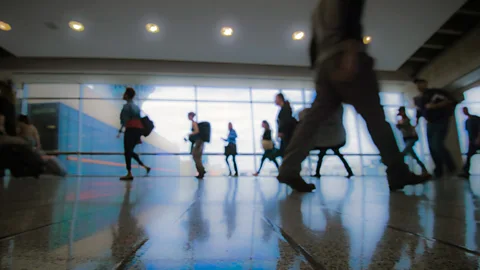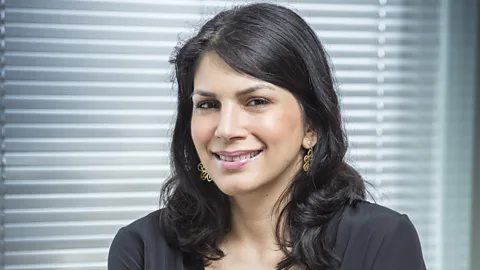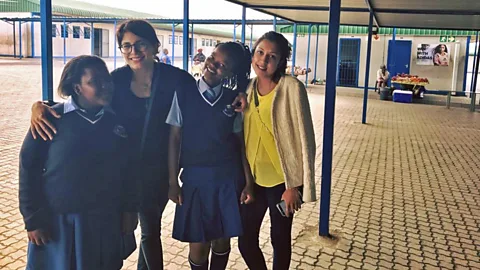The woman who travels 135,000 miles a year for work
 Alamy
AlamyYasaman Hadjibashi spends two weeks a month travelling to multiple continents from her home in South Africa. The hectic schedule gives her a unique perspective, she says.
For half of this year, Yasaman Hadjibashi will commute 26 hours, one way, each month. And that’s just one trip she’ll have to take as she racks up what could be 135,000 miles of travel each year.
From her home in Johannesburg, South Africa her job as the new chief creation officer for Barclays Africa Group will require her to fly around the region to meet with her team and to conferences for networking.
 Yasaman Hadjibashi
Yasaman HadjibashiBut this year, the 34-year-old Hadjibashi became one of 60 professionals to be part of the annual Presidential Leadership Scholars programme. She will meet Bill Clinton, George W Bush and other former US presidents as part of an elite programme that aims to bring different perspectives to leadership and helps foster connections for those at the top of their industries.
“I meet people that I would never cross paths with in an ordinary life,” Hadjibashi says. “Innovation in today’s world is all about collaborating across geographies and ethnicities. You need to put yourself out there.”
Currently, her biggest challenge is promoting innovation in a part of the world that’s known more for enduring some of the world’s worst humanitarian crises, including poverty, famine and disease. To do so, she’s trying to take the lessons she’s learned in places like London and San Francisco—things like the importance of working in teams and collaborating across industries—and contextualise them for the region, a tricky role for a global citizen looking to impact a local landscape.
Much of the time that means the Harvard Business School graduate is trying to forge connections during global conferences with a cross-section of people and companies, taking on guest-speaking opportunities and putting down roots in a continent that’s quickly becoming a focus for growth. “I’ve learned to be very flexible in how I deal with people,” she says. “There is not one right or one wrong way.”
Born in Iran, raised in Germany and educated in the US, Hadjibashi spent much of her earlier career in London, moving to Johannesburg two years ago. As a consummate outsider, Hadjibashi feels she has a different view than most when she works in new environments. “It’s never that I’m just going to a new destination,” she says. “Moving around the world allows for a new way of seeing things.”
Hitting the road
While her schedule is unpredictable, Hadjibashi is usually on the road at least two weeks of the month. When travelling, her days start with a 7:00 run and she kicks of her work morning by 8:30, ending 12 hours later with dinner and drinks. Most of the time, Hadjibashi chooses hotels with fitness facilities, so she can run when on the road. “My workout is my medication,” she says.
 Getty Images
Getty ImagesPacking takes minutes, because she’s learned to live with less. That means her toiletries sometimes stay packed between trips and she travels with clothing in two or three darker colours that she can mix and match. Even at home, she doesn’t own as many things, which makes it easier to stay mobile. “When I came [to South Africa], I bought two suitcases with me,” she says. “I had to offload some of my stuff [at home] in Germany, and started to get used to living very light.”
But even if her physical belongings have less meaning, Hadjibashi still relishes familiar culinary and personal experiences. In London, she’ll have a dim sum brunch at Bright Courtyard on Baker Street. In the US, she’ll purchase a soy matcha green tea latte at a Starbucks coffee shop. And in Iran she’ll order the kebab at Alborz restaurant in Tehran on the first day she’s there. Visiting her father in Germany, she’ll save time for a run along the river Elbe and a meal at her favourite steakhouse. Making these stops is especially important as she’s “less attached to stable permanent material things,” she adds.
Cultural nuances
The result of a whirlwind travel life is that Hadjibashi often picks up on nuances of work culture that she believes only an outsider to those regions can sense. For example, in Germany people are more direct than when she worked with colleagues in the UK, much like in South Africa where co-workers can also be more frank in raising concerns, she says. “People are way more upfront in saying what they like and what they don’t like,” she says.
At meetings, Hadjibashi is aware that cultural norms can impact the time it takes to arrive at a solution. In parts of Western Europe and North America the pace tends to be faster than in Africa, she noticed. Additionally, meetings in Europe tend to be planned in a more detailed manner with presentation slides and agendas than the less-rehearsed types of meetings that she now runs in South Africa. “The urge to [arrive] at key decisions rapidly varies across geographies,” she says. Her own preference is to be somewhere in between.
 Yasaman Hadjibashi
Yasaman HadjibashiShe also hops around to various industry conferences around the globe, often as a judge or guest speaker. Next, she’ll travel to Porto in Portugal and Rwanda.
But even though attending conferences isn’t mandatory for her role and entails a good bit of socialising, she says the trips are all business: “Even if you’re going to a bar, it’s on the back of professional obligations,” she says. “As a senior [executive], you can’t separate the person from the company anymore.”
